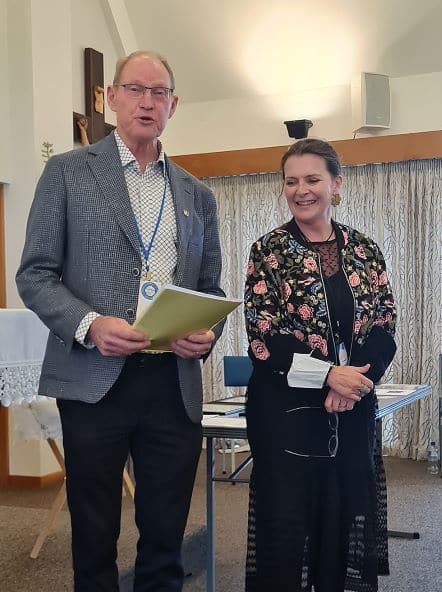Better resourcing for conferences and the need for more members are the top concerns that the newly-elected president of the Society of St Vincent de Paul Canterbury, Mike Moore, will be focusing on.
Mr Moore took over from previous president Mike Daly in the first week of September, and Mr Moore’s first challenge was to present at the SVdP Festival Day held at the Our Lady Star of the Sea parish centre in Sumner.
“It was a great day, and I had to speak to everybody about what the society had achieved over the last couple of years, and what we’re hoping to achieve going forward and a few other issues,” he said, adding that he was very relieved after that was over.
Reflecting on the past couple of years, Mr Moore said that Covid made him realise how important is the service that they provide.
“In the past financial year, the conferences in Canterbury had requests from 7260 households and families for support. That means we’ve supported and helped around 25,000 people, adults and children, in this area. St Vincent de Paul is but one of the many welfare services that are available. So, it does make you realise the significance [of] the level of need in the region,” he said.
Mr Moore said that, with inflation putting significant pressure on food and fuel prices, he expects even greater need in the community in the coming year.
“The plan is to make sure that our conferences are well-resourced, and have sufficient people and income to meet the future needs,” he said.
One of the biggest issues the organisation had faced in recent times has been a dwindling number of members.
“Many of our Vincentians, who have done some magnificent service over the many years, they are starting to retire. You can’t blame them. Particularly with Covid, they were sort of probably not wanting to go out and put themselves at risk. It just brought [home] to us the importance of refreshing our conferences with a recruitment programme,” he said.
Another issue they had to face was the amalgamation of parishes in Christchurch.
He explained that their conferences are based on parish boundaries, so this change has had a big impact on how they operate.
Several conferences have amalgamated into one big conference, although they still operate in their local areas as members cannot be expected to deliver welfare packages all over Christchurch.
“We have 15 conferences, and the numbers will probably reduce over time, but it comes down to the conference members and each conference deciding what option they wish to take,” he said.
As for resources, Mr Moore said that the society is looking at how to better manage their facilities to better store the donations they receive.
He expressed gratitude to some of the hotels which had donated, or are about to donate, their [hotels’] surplus furniture to the Vinnies. “[Furniture] . . . is a great item to be able to sell in our shops because that brings in more value than some of the other donated goods,” he said.
• Welfare lines
Mr Moore worked in the public sector for more than 40 years.
He got involved with St Vincent de Paul after meeting a colleague at a gym. He had just picked up biking with his mates as a hobby after retirement, and thought he needed to start toning up some muscles, he said with a laugh.
“There was another guy there that I got talking to, and it turned out he was from the same church. Not long later, I was in [the] St Vincent de Paul Society, working in the welfare line, two to three days a week. That’s where things all started off,” he said.
Working at the welfare lines showed him “how poorly off” some people were, with many having mental and social issues as well. Mr Moore said his faith propelled him to help people.
“You become more and more aware as you are reading the Scriptures at Mass and the like . . . of the life of Jesus Christ and how he lived and loves people, worked with the poor and the sinners, the down and outers, and his expectations of us,” he noted.
• Pavitt Street project
Mr Moore said that the success of their venture with St John of God Hauora Trust, the Pavitt Street Social Housing Project, has encouraged them to look at going into providing transitional housing.
He said the Pavitt Street Social Housing Project has “made excellent progress” in terms of construction and fundraising needed. These facilities will provide transitional housing for young mothers and children.
“The plan is not just to stop at these sets of units, [but to] continue on and likely become a community housing provider, which means we need to continue finding property, fundraising, and to build these facilities for people,” he said.
Mr Moore said that they were able to raise in full the $2.25 million needed for the Pavitt Street project.
The former bishop of Christchurch, now Wellington Coadjutor Archbishop Paul Martin, SM, started things off with a very generous donation of $500,000 out of the Hoatu Fund.
Mr Moore said that they also received very generous support from the Hugo Charitable Trust, based in Arrowtown, the Kiwi Gaming Foundation and the Christchurch City Council.
“Once the dust has settled here, we will be looking to go to the next stage and find suitable property that might be available. And we can go from there,” he said.

Reader Interactions